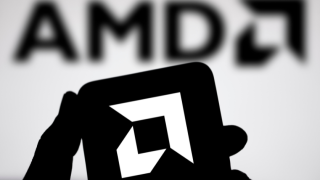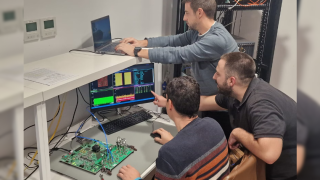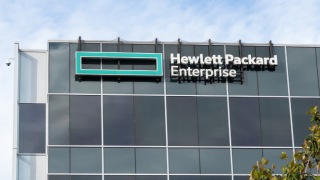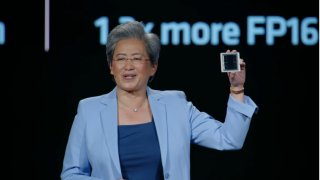AMD
-
The industry group attempting to create an open standard around GPU interconnectivity have unveiled their first specification, which aims to challenge Nvidia's proprietary technology while significantly boosting AI computing performance.
-
AMD has sealed its £4.9 billion ($6.3 billion) purchase of server maker ZT Systems to accelerate its AI and data centre solutions strategy.
-
Lip-Bu Tan, the Intel board member who resigned in protest over the company’s failure to develop a meaningful AI strategy, now holds the reins at the chip-making giant, taking over as takeover news continues to swirl.
-
AMD has unveiled an embedded version of its 5th Gen EPYC CPUs to power edge and networking applications.
-
Some of the biggest names in telecoms kicked off MWC 2025 by unveiling the Open Telecom AI Platform, a new system designed to manage and optimise networks with AI-driven automation.
-
AMD’s data centre arm contributed around 50% of its annual revenue, with Nvidia’s biggest rival reporting an “outstanding year” with demand increasing for its GPUs and CPUs.
Forthcoming events
-
Hunter, the University of Stuttgart’s newest supercomputer came online this week to power intense workloads for AI, biomedical research, and climate modelling.
-
Independent cloud infrastructure firm Vultr, has teamed up with Juniper Networks, AMD, and Broadcom to develop a new data centre architecture that leverages tech from all four firms.
-
Capacity boldly goes where no data centre has gone before: into space
-
AMD has released the latest version of its ROCm software stack for GPUs, adding tools to cut down AI development times.
-
The Frontier supercomputer has lost its crown as the world’s fastest supercomputer to El Capitan, the new exascale supercomputer hosted at the Lawrence Livermore National Laboratory.
-
Engineers at Vodafone are working with AMD to design mobile base stations capable of supporting AI workloads in addition to traditional network operations while using less power.
-
Hewlett Packard Enterprise (HPE) has unveiled new supercomputing solutions designed to power intense workloads like AI language and multi-modal model training featuring innovative cooling features.
-
AMD has unveiled its second-generation Versal adaptive system-on-chips (SoCs) to address the growing demands of data-intensive applications.
-
Intel and AMD have joined forces to establish an x86 Ecosystem Advisory Group, aimed at countering the growing dominance of alternative processor architectures like Arm.
-
Fabless semiconductor firm Xsight Labs has completed the design of its new E1 chip, designed to accelerate networking functions in data centre and cloud environments.
-
Dr Lisa Su, CEO of semiconductor giant AMD, revealed the company’s four-pronged strategy to position itself as a leader in the highly competitive AI chip market.
-
AMD has come out swinging in the GPU battle to take on Nvidia unveiling new hardware and plans to launch new units yearly to keep pace with its rival’s annual product cycle.






























